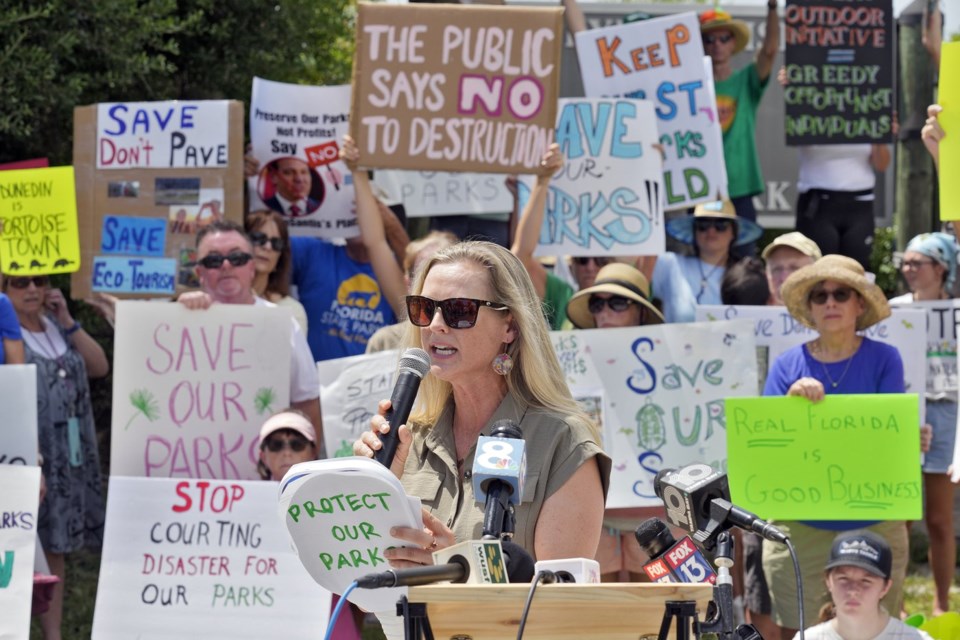TALLAHASSEE, Fla. (AP) — Florida Gov. Ron DeSantis said Wednesday that a controversial proposal by his administration to develop golf courses and pickleball courts at state parks is “going back to the drawing board.”
Questioned by reporters Wednesday, DeSantis worked to distance himself from the plan, which prompted hundreds of protesters to gather at the parks and sparked rare bipartisan opposition, including from Florida’s Republican U.S. Sens. Marco Rubio and Rick Scott.
“If people don’t want improvements, then don’t do it,” DeSantis said. “They’re not doing anything this year. They’re going to go back and basically listen to folks.”
The Republican governor’s Department of Environmental Protection unveiled the plans last week and had planned a single hour of public hearings near the nine affected parks. Amid growing outcry, a golf course proposal at one park was abandoned, and the agency delayed hearings until at least next week — if they happen at all.
The plan for golf courses at Jonathan Dickinson State Park in southeast Florida was scrapped even before the governor’s statements Wednesday. The main proponent of the development, a nonprofit called Tuskegee Dunes Foundation, backed out of the plan over the weekend.
DeSantis' press secretary, Jeremy Redfern, had touted the proposal as a needed effort to expand recreational opportunities in the state.
“Teddy Roosevelt believed that public parks were for the benefit and enjoyment of the people, and we agree with him. No administration has done more than we have to conserve Florida’s natural resources, grow conservation lands, and keep our environment pristine," Redfern said in a statement to The Associated Press last week. "But it’s high time we made public lands more accessible to the public.”
But DeSantis, in breaking his public silence on the issue Wednesday, tried to distance himself from the proposal.
“It was not approved by me. I never saw that,” DeSantis said. “A lot of that stuff was just half-baked and it was not ready for prime time.”
A DEP spokesperson did not immediately respond to a request for comment Wednesday.
Opposition to what the governor calls the “Great Outdoors Initiative” has transcended party lines in a state often fiercely divided by partisan politics. Top Republican legislative leaders and members of Congress have been raising questions along with Democrats and environmental groups such as the Sierra Club and the Cleo Institute.
It has been rare for DeSantis to get pushback on anything from GOP lawmakers, and he has a reputation for seeking vengeance when they do.
But it appears a political line in the sand has been drawn around Florida's state parks, which advocates say are a bastion of wildness in a state where vast stretches of sugar-sand beaches and mangrove forests have long given way to condos, motels and strip mall souvenir shops.
“We are grateful that the Governor heard Floridians and their convictions that the natural resources of state parks are top priority,” said Julie Wraithmell, executive director of Audubon Florida.
Hundreds of protestors gathered at state parks and at DEP headquarters in Tallahassee on Tuesday to voice their opposition to the plans. About 150 people gathered at a rally outside Honeymoon Island State Park along the central Gulf coast, where the plan envisions pickleball courts to be constructed near its unspoiled white sand beaches. Many demonstrators carried signs with slogans such as “Save Don’t Pave” and “Parks Over Profit.”
“After eight days of public outrage, DeSantis was forced to back off plans to develop nine Florida state parks — a huge credit to all the people who united in opposition. That said, we won’t rest easy until the so-called Great Outdoors Initiative is completely dead," said Eve Samples, executive director of Friends of the Everglades. “We will remain vigilant in defense of Florida’s natural lands, water and wildlife.”
_____
Anderson reported from St. Petersburg, Florida.
_____
Kate Payne is a corps member for The Associated Press/Report for America Statehouse News Initiative. Report for America is a nonprofit national service program that places journalists in local newsrooms to report on undercovered issues.
Kate Payne And Curt Anderson, The Associated Press



